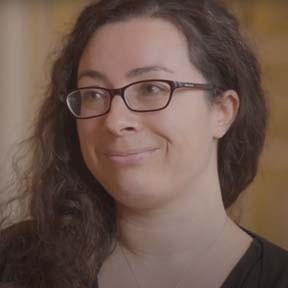With clock-like regularity the debate pops up about whether studying Greek and Latin is still useful. Some claim that classical languages are useless on the job market. For others, they are the foundation of our society. What should we think about that? We asked hellenist Evelien Bracke and got a nuanced answer.
Part of our culture
The question of whether classical languages are useful is not new; it has been asked for at least the last hundred years. It has everything to do with language ideology. Evelien: "How we think about languages has to do with how we think about the world. Some languages are given a higher status than others. Latin and Greek had important functions in European development for centuries and were therefore assigned a high status, but today they are in an ambiguous situation. Socially, they are still seen as an added value and, at the same time, some people also consider them useless and inaccessible."
Today, there is the idea that a (higher) degree has to be mainly useful, read: it has to be an open door to a good job. This utility thinking is actually very narrow, Evelien thinks. "The debate is only about economics. If we open up that utility to the social, it is quite clear that we are still thinking with the Greeks and Romans. Languages, myths and symbols are part of our cultural capital with which we give meaning to our lives and identity. You can see that antiquity is alive and well in all those reissues of mythical stories from a female perspective, such as Circe and Electra. Or the Netflix series around Alexander The Great and Cleopatra. Even in education, studying classical languages goes so much further than just the linguistic."
No statue needed for Greeks and Romans
"The people of antiquity were not the intellectual, morally elevated people we sometimes think to be. They were not flawless, they also did terrible things." Although Evelien herself fell head over heels in love with classics in high school, she is careful not to put the ancient Greeks and Romans on a pedestal. "That only contributes to the idea that classical languages are inaccessible, or only for the strongest students."
An image that is completely at odds with what is going on in our classrooms. "Students have long ceased to only learn vocabulary by heart or hard grammar. They mainly focus on reading texts. But society still thinks of classical languages in terms of outdated didactics. This also makes it harder for teachers to get young people interested in studying. At school itself, we see a lot of enthusiasm among pupils and teachers, which shows that these languages continue to inspire."
Evelien and her colleagues see this enthusiasm first hand in the schools they work with. "In primary schools in Ghent and Aalst, we are running a project where we teach Greek for five weeks. The pupils come from a more difficult socio-economic background and do not otherwise come into contact with Greek. By the time the pupils are in their fifth or sixth year, there is usually already a fairly firm idea of what they can and cannot do. With them themselves, with the parents, sometimes with the teachers. We want to loosen that a bit with our project. We teach at their level, and that appeals to pretty much all pupils."
Let the debate rage
To sum up: classical languages suffer from a narrow economic utility mindset in the current social debate, but they still have a lot of prestige. "There is nothing necessarily wrong with classical languages having a special place in our society," Evelien believes. "As long as we are aware of it and keep thinking critically about it. That's why it's actually good that the debate keeps raging. It's an opportunity to keep evolving. Every generation is going to redefine the meaning and usefulness of classical languages. Its function will always adapt to the needs of society, in the 21st century as well."

Evelien Bracke is a postdoctoral researcher at the Faculty of Arts and Philosophy and author of Classics at Primary School: A Tool for Social Justice, a book with a practical toolkit for teaching Latin and Ancient Greek in primary schools. The aim is to increase opportunities for primary school-aged children who have traditionally been denied access to classical languages in education.
Read also
Identifying emotions in texts, a language technology marvel
With the aid of AI, Ghent-based company AlfaSent is able to recognise emotions in texts. It’s a prime example of language technology, an area that is rapidly gaining ground. Founder and UGent alumna Ellen De Geyndt: “I’ve always been interested in both language and technology but I wasn’t aware that I could combine the two.”
Ghent University to train the language technologists of the future
At the Faculty of Arts and Philosophy, starting next academic year, you can opt for an educational track to become a language technologist. A sought-after profile on the job market, so it seems.
Cruel summer? Not for this UGent’er
This summer it was hard to miss: at Ghent University you would soon be able to take a “Taylor Swift-class”. A storm of reactions blew up, the crackle could be heard all the way to the United States. In the eye of the storm: professor Elly McCausland and her elective course Literature (Taylor’s version). “It was a lot, but I’ve grown quite a thick skin.”



